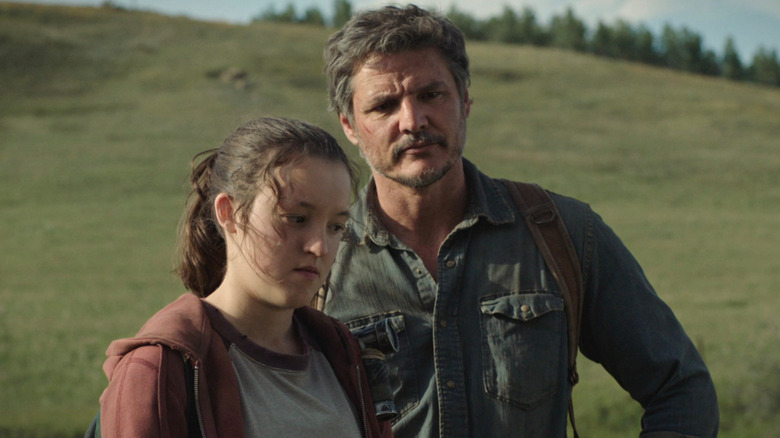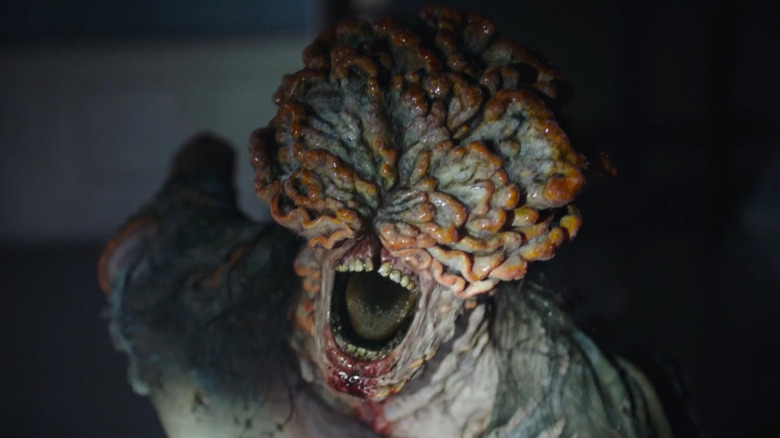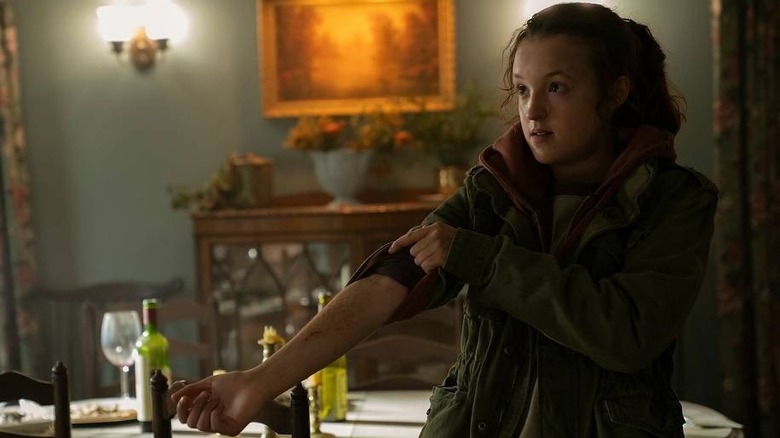How The Last Of Us Sets Itself Apart From The Walking Dead
Contains spoilers for "The Last of Us" Season 1, Episode 4
When "The Walking Dead" was first announced in 2009, fans of the comic book series by Robert Kirkman, and fans of horror in general, were ecstatic (via MTV). With "Shawshank Redemption" and "Green Mile" writer Frank Darabont at the helm, expectations were high. Andrew Lincoln, who portrayed Rick Grimes until Season 9, recalled to MTV how Darabont told him to prepare for his role: "He said, 'I want you to watch two things': 'Breaking Bad,' which is a show he was a huge admirer of, so I rewatched the first series. And he said, 'Watch Gary Cooper,' so I watched 'High Noon.'"
Featuring strong character development and authentic observations of human struggle in a post-apocalyptic world, the series met and surpassed expectations. It was not only AMC's most-watched premiere but also among the most-watched premieres in the history of cable television (via The Hollywood Reporter). At the show's peak, 17.29 million watched the Season 5 premiere in 2014.
But the decline of "The Walking Dead" was inevitable, and the constant changing of showrunners — Angela Kang was the fourth by the end of the series — didn't help things. The tone of the show shifted, characters died more frequently, and the character development aspect declined. Now that we have "The Last of Us," a different kind of postapocalyptic series based on a popular video game, some are wondering what makes this show any different from "The Walking Dead."
The fungus on The Last of Us is real
While it'd be easy for many to dismiss "The Last of Us" as a "Walking Dead" clone, the new series is different in key ways. The biggest and most distinct difference has to do with the "Walking Dead" zombies' origins, which Robert Kirkman has always refused to divulge except for a joke tweet about it being caused by "space spores." The premise of "The Last of Us," on the other hand, is based on something that actually exists in nature: Cordyceps fungi. Spores infect insects, taking over their muscles. The fact that this is actually something that occurs to insects immediately makes it feel scarier, even if it is implausible that it could make the jump to humans.
In the series, a new strain of Cordyceps fungi has found a way to take over humans, creating "the Infected" and "Clickers." People get infected by either being bitten or inhaling a spore. More dramatic than toxic spores blooming from a dead insect, Clickers are shown to have fungus growing from their cracked-open heads. The Infected are all connected, with the fungus growing deep underground. As Tess Servopoulos (Anna Torv) puts it, "You step on a patch of Cordyceps in one place, and you can wake a dozen Infected from somewhere else. Now they know where you are, now they come."
While being chased by a horde of zombies has always seemed pretty scary, the idea of accidentally stepping on Cordyceps and awakening dozens more that will join the hunt sounds extremely anxiety-inducing.
The basis of The Last of Us is Ellie's immunity
Another difference between "The Walking Dead" and "The Last of Us" is the distinctly different plots. Robert Kirkman had no interest in pursuing a storyline related to figuring out where the virus came from or finding a vaccine or cure. The show was about survival and the interpersonal interactions between the people and different groups that survived. "It's kind of a mythology-breaking proposition. You don't want that kind of thing as far as somebody being immune," he said at San Diego Comic-Con 2017 (via Comicbook.com). "To go off and try to solve this would be a boring show, so definitely not."
The characters on "The Last of Us" and "The Walking Dead" may all be survivors, but the plot similarities end there. The focus of "The Last of Us" is on the exact thing Kirkman wanted to avoid: somebody being immune. Ellie (Bella Ramsey), the first known human to have immunity to the fungus, embarks on a journey with Joel (Pedro Pascal) to get to the Fireflies, who plan to use her immunity to create a vaccine. While we definitely meet interesting characters along the way, it's Joel's relationship with Ellie and the two learning to trust each other on their journey that is at the core of the series.
"The Last of Us" puts its own twist on a world in which an infection destroys humanity. It may share similar-looking postapocalyptic scenery with "The Walking Dead," but beyond that, it has its own unique story to tell.


